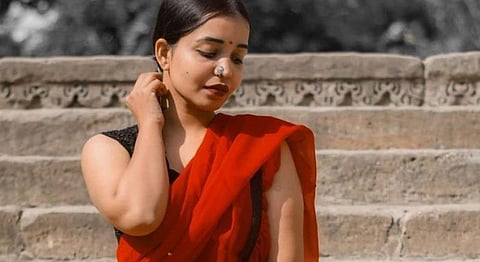
- HOMEGROWN WORLD
- #HGCREATORS
- #HGEXPLORE
- #HGVOICES
- #HGSHOP
- CAREERS
- ABOUT US
- CONTACT US

Every day on the internet is like Tom Hanks starrer Forrest Gump’s box of chocolate; you never know what you’re going to get. When slam poet Andrea Gibson, pondered “What if you are the love of your life?,” what I didn’t think about was a whole new generation of women (and women across generations) willing to make grand declarations of ‘main apni favourite hoon’ (I am my favourite) in the form of marrying themselves.
All 90s trends are back and so is ‘Sologamy’ — the term that translates to mean self- marriage. The resuscitated trend first took place in 1993, when Linda Baker married herself. In 2003, Carrie Bradshaw from the popular show Sex and the City declared maybe she should wed herself as an act of defiance against a society that stigmatizes single women in their late thirties and forties. Just a decade or so later, Adriana Lima, the Brazilian supermodel had tied the knot with herself in an elaborate ceremony in Monaco.
In a first, for India, is 24-year old Kshama Bindu from Vadodara, Gujarat who is set to tie the knot with herself on June 11 with the entire fan fare of an Indian wedding. There will be ‘pheras’ there will be vows to herself, there will be sindoor and there will also be a two-week-long honeymoon to Goa post the wedding. In an interview with The Times of India, Bindu said that while she doesn’t want to get married, she does want to ‘be a bride.’
In the same interview, she said, “Maybe I am the first to set an example of self-love in our country.” Declaring that, “Self-marriage is a commitment to be there for yourself and unconditional love for one-self. It’s also an act of self-acceptance. People marry someone they love. I love myself and hence this wedding.” She believes that while some may consider this move ‘irrelevant’ she is doing so to portray the fact that women matter.
While no law holds this form of marriage as legally binding, the supporters and advocates of the movement argue that the act of sologamy, is a declaration of self-love and the highest form of commitment to oneself. It is not so much about the validity behind the act but what it signifies. It is a way of holding yourself with care, accepting yourself, and declaring your love for yourself in a society that profits from our insecurities.
I for one wonder if this entire concept is a classic case of self-love ( it’s not like it’s tough for the internet to misinterpret what things mean) taken too far, but almost, in a second thought, it is worth questioning why more women than men feel the need to make these grand declarations of self-love? Is it the by-product of a society that forces women to aspire to marriage as being the ultimate goal? Or of a society that places the onus and burden of relationships on women? Or a society where to be ‘complete’ translates to finding ‘the one’ in your 20s and if not then by your early 30s at the very least? A society where even the capitalistic burden of self-love and all the ways to embrace your uniqueness has for the larger part been directed at women?
Taken by itself, the act of marrying oneself isn’t radical, it isn’t even something new. At the end of the day, it is still a patriarchal ploy, already agreed upon and sanctioned by society as something that is life-altering and as something that matters. What these women then are doing is bending the rules and making transgressions that deviate from conventional norms. It’s an individual statement saying that a ‘man’ isn’t what makes them ‘whole.’ It is an embracing of the age-old cliché that says we’ve got to love ourselves.
If you enjoyed reading this, we also suggest:
